FICTION
|
|

|
|
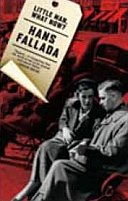
Little Man, What Now
|
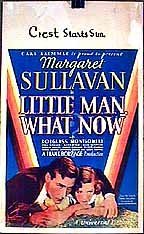 ' '
|
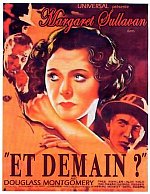
|
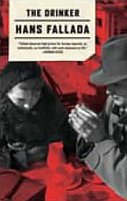
The Drinker |
|
BOOK
ILLUMINATIONS
From Merrimon Book Reviews
HOME
ROMANCE
FICTION SUSPENSE & THRILLERS
MYSTERY
AUTHORS REVIEWER
PROFILES
|
Every Man Dies Alone
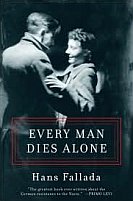
by Hans Fallada

Trust and resistance; ordinariness and heroism
First
published in 1947, the first English translation of EVERY MAN DIES ALONE is part of
three-book simultaneous publisher release together with LITTLE MAN, WHAT NOW? and THE DRINKER. Once bestsellers in
America, the works of Hans Fallada now are relatively obscure due to
Hitler's order that his books could no longer be sold outside
Germany. Even after an arrest by the Gestapo for his refusal to
join
the Nazi Party, Hans Fallada stayed in Germany. Written after the
fall of the Reich, Hans Fallada wrote EVERY
MAN DIES ALONE based on the Gestapo file of a real couple who
resisted the Nazis. Now available to a new generation of English
speakers, EVERY MAN DIES ALONE
stands as a haunting portrait of the life experienced under the Nazi
rule and an even more chilling portrait of the dynamics within a
society when the basic bonds of trust in institutions and one another
are broken by a ruthless government. Against all this, Hans
Fallada tells the story of one couple's determined resistance to speak
out against the lies.
Foreman Otto Quangel and his wife Anna are law abiding citizens.
Skeptical of the the value of many of the war-time organizations and
the corruption that went along with the propaganda, they never joined
the Nazi Party. Nevertheless, their son joined the
military. No one would brand them traitors or even
malcontents. When news of their son's death reaches them, one
comment by Anna to her husband leads him to question his implicit
support of Hitler. Determined to make some kind of stand, he
bands together with his wife to counter the propaganda of the
regime. Alongside their story, Hans Fallada depicts the lives of
the Quangels' neighbors and countrymen, from an older woman desperate
for love and the ever present snitches to the horrifying life of a
Jewish woman and the man attempting to save her, from Inspector
Escherich determined to catch the Quangels to the judge within the
state-run court system. Hans Fallada gives readers an inside look
at the life as it might have been experienced by a wide range of
characters in Germany during World War II. Economic deprivation
touches every aspect of life. Corruption, a thriving black market
and a desperation to remain safe at all costs, even to the point of
turning a blind eye to the horrors of a society turned against itself
influence the decisions of the characters.
With a quote from Primo Levi describing this book as "the greatest book
ever written about German resistance to the Nazis," what reader of
resistance or WWII literature can resist EVERY MAN DIES ALONE?
With these authors' personal history behind them and known to today's
readers, this quote has a weight more intense than the author marketing
blurbs across covers of current day bestsellers. For this reader,
EVERY MAN DIES ALONE
lived up to Primo Levi's estimation. Hans Fallada describes the
very act of resistance on an intimate level, not only in the marriage
of the Quangels, but its effects on all those lives connected to the
Quangels. The grand success or failure of their resistance is
less important than the very act of resistance and the surety that they
must resist. Through the portrayal of Quangels, Hans Fallada
strips away all the questions of effectiveness or results used as
excuses for inaction to focus on the effects the resistance not only on
the individuals as the resistance begins to define them rather than the
lies, but also the rippling effect outward to others, often those one
would least expect. Alongside the story of the Quangels' heroic
decision to act, Hans Fallada tells a chilling tale of a regime so
focused on rooting out dissension that not even its defenders are
immune from scrutiny.
EVERY MAN DIES ALONE is
a fast-paced read. Certainly, the desire to know the outcome
hastens one's reading speed, but the prose itself has a directness and
beautiful simplicity that draws the reader into the story. I
carried this book with me everywhere until
I made it to the last page and then quickly ordered another in the
three-book simultaneous release. The non-heroic portrait of the
Quangels, indeed their very ordinariness at the beginning of the story
as well as their simple, small action makes this fictional story of
resistance have an even greater impact than if he had portrayed them as
more classically heroic figures. In some ways, the Quangels are
like Everyman.
EVERY MAN DIES ALONE
will appeal to readers wanting to explore the
horrors of the Nazi regime from within and its effects on the citizens
and the society. In addition, EVERY MAN DIES ALONE will appeal to
English speaking lovers of literary fiction, creating a fuller picture
of the place of Hans Fallada in the pulse of historic German
literature. While many authors escaped Nazi Germany, Hans
Fallada did not. His fiction gives readers a look at German
literature and society from the inside looking within.
Publisher: Melville
House (March 2009)
Translator: Michael Hoffman
Reviewed by Merrimon,
Merrimon Book Reviews
Courtesy of Amazon Vine

|
|
|